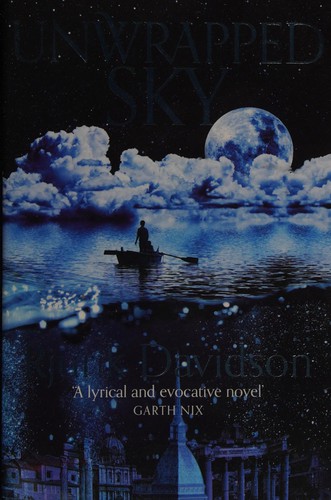Keith Stevenson reviewed Unwrapped Sky by Rjurik Davidson
Review of 'Unwrapped Sky' on 'Goodreads'
5 stars
My review of Unwrapped Sky originally appeared on the Newtown Review of Books (www.newtownreviewofbooks.com.au)
The city of Caeli-Amur was born out of the imagination of Australian writer Rjurik Davidson in 2005 with his Ditmar Award-shortlisted story ‘The Passing of the Minotaurs’. It appeared again in 2008’s ‘Twilight in Caeli-Amur’ in Jack Dann’s Australian speculative fiction anthology Dreaming Again, and its legends were further added to with the publication of two more stories set in the city in Davidson’s debut collection The Library of Forgotten Books.
It was clear at the time that Davidson was on to something. Caeli-Amur, and its sister city Caeli-Enas, sunk beneath the sea during the Cataclysm, was at once dreamlike and fantastic but also strongly grounded in industrial realism with an accompanying political sensitivity. The mixture worked well in the short form, but could the fine contradictory balance Davidson struck be sustained at novel length, or would the whole house of cards come tumbling down, solidifying Caeli-Amur into just another standard fantasy backdrop?
Unwrapped Sky is the first in a Caeli-Amur trilogy, so it is clear that those fears have not hampered Davidson’s ambition. In fact, dipping into the novel you see that he has in fact relished the challenge, diving in boots and all to not just fully realise his city, but also place it firmly within a wider geography informed by a detailed history that covers millennia beforehand while remaining relevant to the action depicted. Add to that an eclectic fusion of magic, science, revolutionary theory, philosophical discourse, inter-racial friction, inter-species disputes, extra-dimensional beings and mythological creatures, as well as a meditation on the terrible things people do to each other all in the name of security, love, freedom or the search for knowledge, and you begin to get an inkling of the prodigious tapestry that Davidson has woven here. He’s had ten years to think about Caeli-Amur, and he hasn’t wasted a second.
Over four hundred years that city had slept beneath the ocean, and with it the last secrets of the ancients. A sense of wonder awakened in Kata. For the first time in years, she felt that the world was a large place filled with possibility.
‘Most of the city was white marble,’ said Aemelius. ‘I walked those streets when I was young. I watched white-caparisoned horses pull crow-black carriages. I watched street-officers lighting gas lamps on hot summer nights as lovers drifted through the wide streets.’
‘How old are you?’ asked Kata.
‘Five hundred and twelve.’
Kata drew a long, quiet breath. So old. Eventually she said, ‘There is a sadness about you.’
Unwrapped Sky follows the fortunes, or otherwise, of three main characters – Kata is a philosopher-assassin indentured to House Technis, one of the three great houses that concentrate power in Caeli-Amur and keep the populace oppressed. Her latest assignment is to kill two minotaurs, who are visiting the city for the Festival of the Bull, so the house thaumaturgists can harvest their horns, eyes and other organs for their magical works. She’s representative of many of the people of Caeli-Amur, caught by poverty and circumstance and forced to do the houses’ bidding in order to survive. There is little nobility in this city.
Boris Autec was a tramworker but is now a sub-officiate for House Technis. He dreams of rising to power so he can exercise his authority to improve the working conditions of his former colleagues. His lofty aims, however, are subverted by the house and its shadowy controllers, the other-worldly Elo-Talern, who use his baser desires to compromise his character. There is much to dislike about Autec, because he continues to delude himself that he can make things better while indulging his vile weaknesses in rape and murder, but he’s just a puppet of the house system in the end, and as blameless as the rest.
Maximillian is a thaumaturgist and a member of the seditionist group who plot the overthrow of the houses. He dreams of a peaceful revolution and hopes that mastery of thaumaturgy might help him achieve that. But he also finds the pace towards revolution stiflingly slow and so supports a regime change in the seditionist leadership that may ultimately lead to the violence he hoped to prevent.
Maximillian kicked at the unravelling twine of his boot, pressing it close to the leather. ‘But that is very much modern thinking. The trend of the day is to see things as falling apart, to think that we still live in a world of cataclysm. Yet in the long view of history, have things not been rediscovered? Surely we are on the path of development back toward the time of the ancients. Are not our populations growing? Aren’t we emerging from that dark age of which you speak? Isn’t this the very basis for the growth of seditionism itself? With each step in our knowledge and our production, are we not better placed to build a better world?’
The philosopher in Kata was now alive. ‘You are relying on the illusions of the ancients before the cataclysm. They were wrong. There is no inexorable progress. Nor are the laws of history on our side. There is no line of improvement between the knife and the bolt-thrower, the sword and the incendiary device,’ she said. ‘The Houses control everything. They ruin everything. They kill – ’ She stopped and thought of Aemelius, of his long lashes, of his black eyes. ‘They – ’
‘They must be destroyed,’ said Louis.
‘Destruction?’ said Maximillian. ‘We must be purer. We must be the new people we hope a better world will create. We must avoid revenge.’
‘Revenge is for those who have lost their way.’ Again Kata thought of Aemelius. She would do the House’s bidding. She would survive. She always had.
To attempt to summarise the plot of Unwrapped Sky would be to do it a disservice. There are too many important strands that would have to be left out in any kind of summary. You may as well try to sum up real life, and that’s the complexity that Davidson is reaching for here. The story moves from personal struggle and tragedy to history-changing events and upsets and back again, cataloguing triumphs, defeats, reversals and bitter ironies. If I were allowed one personal quibble it would be that there are some sections that are unremittingly dark. This is not a cheery read on the whole and few characters reach a happy conclusion. But Unwrapped Sky is representative of the best of Australian contemporary fantasy writing. If you’re serious about the genre, this is one volume you cannot ignore.

